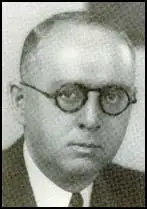David K. Niles

David K. Niles, the first of six children of Russian Jewish immigrants Asher K. Neyhus and Sophie Berlin, was born on 23rd November, 1888. He and his father kept the middle initial "K" to honor their heritage as kohanim.
Niles graduated from Boston Latin School in 1906. Little is known of his early career but in 1921 he became Associate Director of Boston's Ford Hall Forum. Its stated mission was "to promote freedom of speech and foster an informed and engaged citizenry through the public presentation of lectures, debates, and discussions." It caused great controversy by providing a platform for radicals such as Margaret Sanger and W. E. B. Du Bois.
Niles became closely involved in the political career of Franklin D. Roosevelt. In 1936 was appointed by President Roosevelt as director of the Works Progress Administration (1936-1939). Niles formed an alliance with Ernest Cuneo, another of Roosevelt's political advisors. Both men were involved in persuading Roosevelt to give support to Britain in its fight against Nazi Germany.
Cuneo was also an agent of the British Security Coordination (BSC). It is believed that the two men helped to establish the extreme interventionalist organisation, Fight for Freedom. A telegram sent by Peter Cusick, who worked for the organisation, sent a telegram to Niles: "Hope you can talk to Ernest Cuneo today in Washington." According to Nicholas J. Cull, the author of Selling War: The British Propaganda Campaign Against American Neutrality (1996), Cuneo used Niles as his intelligence contact in the White House.
It has been pointed out by Thomas E. Mahl, the author of Desperate Deception: British Covert Operations in the United States, 1939-44 (1998), that Niles also worked closely with Hadley Cantril, Roosevelt's advisor to George H. Gallup: "While analyzing Gallup results in 1943, Cantril came up with the startling observation that FDR's prospects of peace. If peace was at hand in 1944, FDR would have serious trouble getting re-elected." He was asked by Niles if the results could be suppressed. Cantril replied that this was not his style "but I have tried to influence poll results by suggesting issues and questions the vote on which I was fairly sure would be on the right side."
Hadley Cantril worked as an advisor to George H. Gallup and worked closely with David Ogilvy, who was employed by Gallup and was also an agent for British Security Coordination. It has been pointed out by Thomas E. Mahl, the author of Desperate Deception: British Covert Operations in the United States, 1939-44 (1998): "While analyzing Gallup results in 1943, Cantril came up with the startling observation that FDR's prospects of peace. If peace was at hand in 1944, FDR would have serious trouble getting re-elected." He was asked by David K. Niles of the White House if the results could be suppressed. Cantril replied that this was not his style "but I have tried to influence poll results by suggesting issues and questions the vote on which I was fairly sure would be on the right side."
In 1939 Niles was appointed as Special Assistant to the Secretary of Commerce (1939-1940), as well as a consultant and advisor to the Office of Production Management and War Production Board. In 1943, Frederick Van Ness Bradley, a Republican from Michigan's 11th Congressional District accused Niles of having Communist connections while involved with the Ford Hall Forum.
After the death of President Franklin D. Roosevelt, Niles was one of only two of his aides retained by Harry S. Truman. It has also been claimed that Niles was deeply sympathetic to the hope of establishing a Jewish state in their homeland in Palestine, and was important in providing access to the White House for Zionists.
David K. Niles died in Boston, Massachusetts, on 28th September, 1952.
